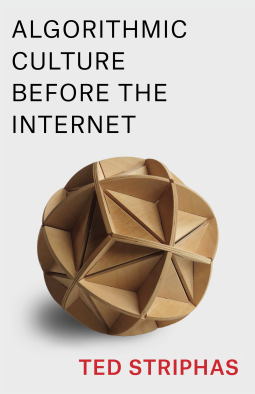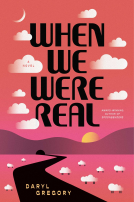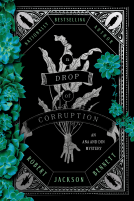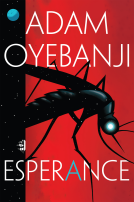
Algorithmic Culture Before the Internet
by Ted Striphas
This title was previously available on NetGalley and is now archived.
Send NetGalley books directly to your Kindle or Kindle app
1
To read on a Kindle or Kindle app, please add kindle@netgalley.com as an approved email address to receive files in your Amazon account. Click here for step-by-step instructions.
2
Also find your Kindle email address within your Amazon account, and enter it here.
Pub Date Jun 06 2023 | Archive Date Sep 13 2023
Talking about this book? Use #ColumbiaUP #NetGalley. More hashtag tips!
Description
Today, algorithms exercise outsize influence on cultural decision-making, shaping and even reshaping the concept of culture. How were automated, computational processes empowered to perform this work? What forces prompted the emergence of algorithmic culture?
Algorithmic Culture Before the Internet is a history of how culture and computation came to be entangled. From Cambridge, England to Cambridge, Massachusetts by way of medieval Baghdad, this book pinpoints the critical junctures at which algorithmic culture began to coalesce in language long before it materialized in the technological wizardry of Silicon Valley. Revising and extending the methodology of “keywords,” Ted Striphas examines changing concepts and definitions of culture, including the development of the field of cultural studies, and stresses the importance of language in the history of technology.
Offering historical and interdisciplinary perspective on the relationship of culture and computation, this book provides urgently needed context for the algorithmic injustices that beset the world today.
About the author: Ted Striphas is associate professor of media studies and affiliate faculty in information science at the University of Colorado, Boulder. He is the author of The Late Age of Print: Everyday Book Culture from Consumerism to Control (Columbia, 2009) and coeditor of the journal Cultural Studies.
Advance Praise
"Algorithmic Culture Before the Internet tackles a too-often neglected aspect of our computer world: the cultural dimensions of algorithmic certainty. Ted Striphas shifts our critical gaze away from the supposed historically and technologically unique features of digital mechanisms to construct a sweeping tale of terminology, logic, and instrumentality. He has written an essential study that is by equal measure surprising, convincing, and engaging."
—Charles R. Acland, author of American Blockbuster: Movies, Technology, and Wonder
"Ted Striphas writes engagingly about the history of the entanglement of the concepts of 'culture' and 'algorithm' by rethinking the cultural work of the humble keyword. This is the book—and the histories—we need to help us understand what is at stake in the prevailing articulation of culture, technology, and power."
—Anne Balsamo, author of Designing Culture: The Technological Imagination at Work
"Masterful and fascinating. Each chapter, grappling with a keyword and uncovering its fraught construction, took me somewhere I didn’t expect to go. This is the book we need to advance the study of algorithms as part of the history of culture."
—Tarleton Gillespie, author of Custodians of the Internet: Platforms, Content Moderation and the Hidden Decisions That Shape Social Media
"This prehistory of algorithmic culture steps back from the relentless novelty of much writing about computing, helping us realize that algorithms, culture, and the relationship between them are stranger and older than we might have thought."
—Nick Seaver, author of Computing Taste: Algorithms and the Makers of Music Recommendation
"This book takes readers to unexpected places, making brilliant and original connections across vast bodies of knowledge. It is sure to enhance the historical understanding of anyone interested in computers, social media, and the culture of the late twentieth and early twenty-first centuries."
—Siva Vaidhyanathan, author of Antisocial Media: How Facebook Disconnects Us and Undermines Democracy
Available Editions
| EDITION | Other Format |
| ISBN | 9780231206693 |
| PRICE | $30.00 (USD) |
| PAGES | 336 |
Available on NetGalley
Featured Reviews
4.5 stars.
I was really curious when I saw the title because I wondered how algorithmic culture could exist before computers. I'm not sure what I was really expecting, but this surprised me. This had a very slow start, like it took fifty percent of the book to get to when and how the word "algorithm" developed. I thought the first part of the book was overly explained, but when talking to my friends about the subject, many of them did not understand the use of algorithms and culture in this way, so the in-depth discussion at the beginning of the definitions was helpful.
A lot of this book seems tangential and irrelevant at first, until you get to a point where the author ties it into the main point. In this book, many things are discusses, like the inception of algebra and the algorithm, how technology has been influencing and affecting our lives throughout history, the meaning of "culture" and how it has changed, the tumultuous beginnings of the science of sociology, how the government uses culture to manipulate us and some of the ways they've done so throughout history, etc. The text was heavily cited and some of the reference materials intrigued me enough to get added to my "to read" list. It's definitely targeted to sociologists and may be inaccessible to many, style and diction-wise. I don't know much about sociology but I still learned a lot from this book. If it was more condensed and focused, I would've enjoyed this more.








